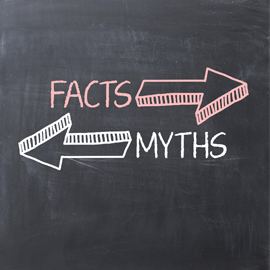Common Diet and Fitness Myths
July 2010
 You want to lose weight, and you’ve heard that diet and exercise is the best way to be successful. Great! Perhaps you’ve been overwhelmed by the mountain of information on weight loss, diet, and fitness. Unfortunately, you may find that one piece of advice conflicts with another, and it can be difficult to know which suggestions to listen to as you build your weight loss plan. Get the truth about common diet and fitness myths.
You want to lose weight, and you’ve heard that diet and exercise is the best way to be successful. Great! Perhaps you’ve been overwhelmed by the mountain of information on weight loss, diet, and fitness. Unfortunately, you may find that one piece of advice conflicts with another, and it can be difficult to know which suggestions to listen to as you build your weight loss plan. Get the truth about common diet and fitness myths.
Myth 1: If you don’t eat carbohydrates, you’ll lose weight.
Low-carb diets have become increasingly popular over the last several years. The theory is that the insulin your body produces when you eat carbohydrates prevents your body from using stored fat as energy. However, research hasn’t been able to link weight loss from low-carb dieting to insulin levels. Most experts agree that you must burn more calories than you consume in order to lose weight. Any weight that is lost while on a low-carb diet is probably the result of lost water weight, an increased feeling of fullness due to high amounts of fat and protein, and fewer calories consumed because of food restriction. This type of weight loss can be very difficult to maintain and may lead to cardiac health problems if you’re consuming too many saturated fats.
Myth 2: If you don’t look overweight, you don’t need to worry about diet and fitness.
Poor eating habits and inactivity can cause a number of health problems, regardless of what the number on the scale says. It’s also possible to have an excessive amount of body fat while appearing normal weight or being within a normal weight range. This condition is known as normal weight obesity and can generally be treated with proper diet and a regular fitness routine.
Myth 3: If you exercise daily, you don’t have to watch what you eat.
For people who enjoy working out and struggle with eating healthy, it can be tempting to try and work the weight off without changing your diet. Research has shown that it’s almost impossible to lose weight through exercise alone, in part because working out often triggers hormones that cause you to eat more. Exercise also won’t address your body’s need for essential vitamins and nutrients.

